Tuesday, May 16th 2017

AMD Announces High Performance Computing Platform - "Naples" is EPYC
Today on their Financial Analyst Day 2017, AMD has taken the lid off their "Naples" Zen implementation. The balanced Zen core in its unrestrained, server-grade level has become EPYC, with AMD CEO Lisa Su holding the silicon in her bare hands. The new EPYC platform with its I/O performance improvements allows more GPUs to be connected to a CPU than any other platform, with up to 128 PCIe lanes being expected on these server-grade chips.The Naples-based EPYC chips as announced by Lisa Su will carry up to 45% more cores, leveraging 122% greater memory bandwidth, and 60% more I/O bandwidth than their competitor's (read, Intel's) solutions. Expect more information to be available shortly.AMD is also looking at EPYC to usher in virtualization environments...Thought it would seem that what the company is actually looking to do is out-muscle Intel in the server market by offering not only greater performance, lowered power consumption and greater flexibility...While tearing Intel a new one in the platform density equation, announcing a denser platform that simultaneously offers more cores and more I/O, while taking up less space and consuming less power, which should also improve thermal characteristics and overall operating costs, which are frequently much higher throughout the lifespan of the hardware than the initial investment.AMD also promises a much simplified machine intelligence architecture compared to Intel's by fully integrating platform requirements in their EPYC processors.But this is not all: AMD is committing to a road-map of excellence, with further upgrades to its platform linearly lined-up so as to allow businesses to perform long-term planning and investment.
Source:
AMD Financial Day 2017 Webcast
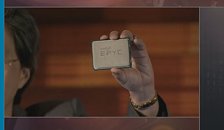

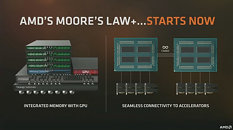
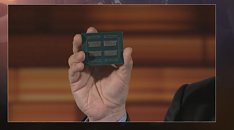
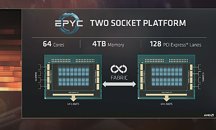
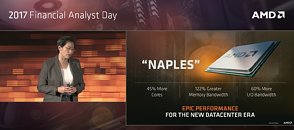

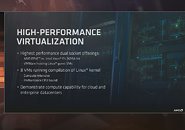
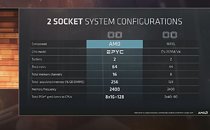


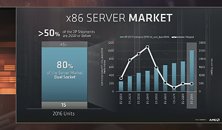
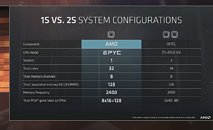

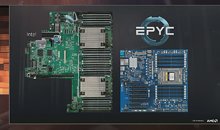
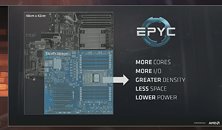
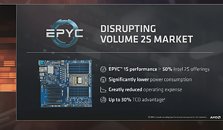
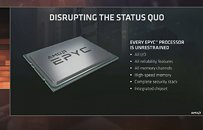
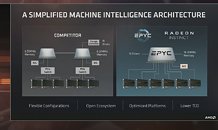
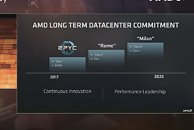
40 Comments on AMD Announces High Performance Computing Platform - "Naples" is EPYC
Seriously I could do better in 5 minutes.
keep the same scheme, blitzen or blytzen
The whole Ryzen marketing is built around gaming and flashing red websites. I didn't like it, but whatever - I guess most of their customers are gamers at this point (it clearly worked).
I really hoped that Naples will have serious marketing "environment" and a bit less of red in it. Well... at least the latter is happening:
www.amd.com/en/products/epyc
Also, wccftech has shown some numbers for the EPYC... including 1.4GHz base clock - I sure hope this is a typo...
Are these names made by someone who is thirteen years old?
How do they compare with Intel's offerings
and if they compare favorably -
How much do they cost
inb4 EpycFailWell when talking about tech to a non-tech person dumb things like this tend to stick out and make things a little bothersome. Most of the time as much as I'd like to give the reply "I dunno, I didn't fuxxing name it," I can't
idk, I dont see the problem.
it going to be along the lines of "...due to your needs and budget considerations, I'd recommend the Epyc platform...."
Customer: "Oh that sounds fancy, does it perform as epic as it sounds" or something equally cringey.
That's the kind of people I have to deal with.
Tech person who avoids tech because "it has weirdo name" is not a tech person, no offence.
Which uses Explicitly Parallel Instruction Computing (EPIC) instead of CISC or RISC...
And was / is intels flag ship processor.
Most likely it's nothing but a cheap play on the word "epic".
BTW; Itanium is no longer Intel's flagship, development stopped half a decade ago.
As far as "tech people" go:
1) Let's just say this: a lot of TPU forum users are gamers and have limited knowledge of computers.
2) Among the group with above average knowledge, it's mostly about hardware. Software know-how is surprisingly sparse here (which is beautifully pictured by Ryzen threads :)). Also, the hardware knowledge is more practical (how to build PCs, how to OC) than theoretical (how a CPU works).
Only kids care WHAT the name of the CPU is; men/professionals care about shear performance. It might seems as trolling alot of you guys but I think you are caught in at the point where talking about CPUs means more than actual CPUs. Complaining about the naming when 7 years of development is articualted into a product (whether intel or AMD) seems almost benign ignorance. I hope most of you subject your world to a higher level of critism. How many systemadmins will be like; "20% more power.... but the name... we'll pass" (fired within a week)